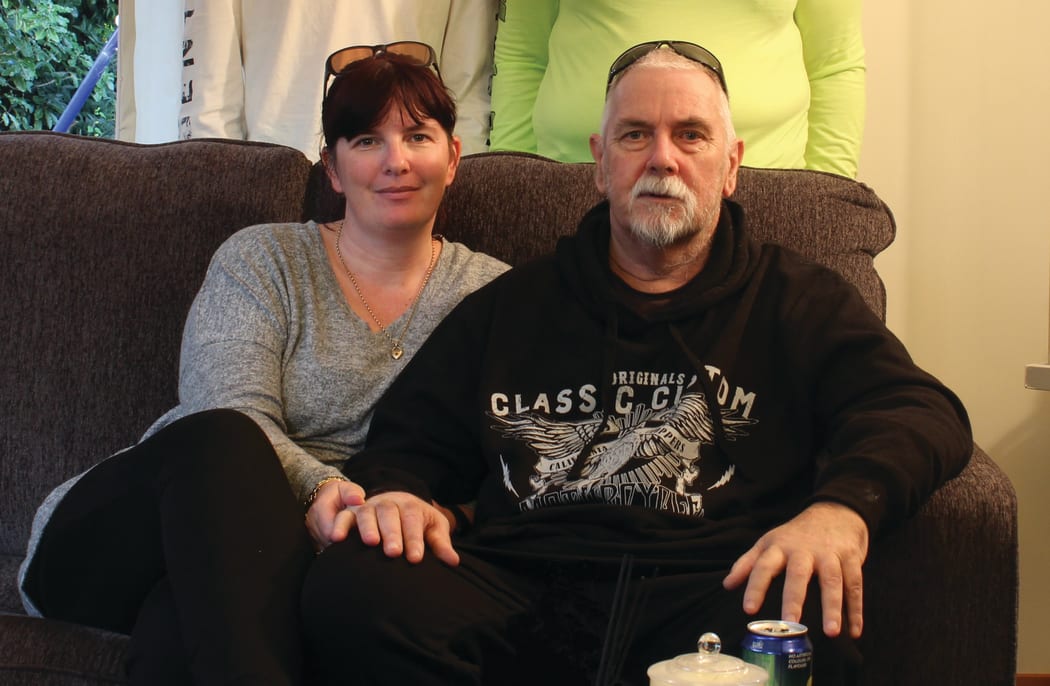Auckland Hospital staff have apologised to a Dargaville builder left with brain damage after he was given an overdose of morphine.

Dargaville couple Kylie and Trevor Flood are demanding answers after Trevor suffered brain damage from a morphine overdose at Auckland City Hospital. Photo: RNZ / Mick Hall
Members of the hospital's review team, which included head oncologist Dr Richard Sullivan, met Trevor Flood and his wife Kylie last month to discuss the events leading up to the incident and how the couple had coped since.
Mrs Flood told RNZ she felt relieved after the meeting.
Senior staff spoke of possible changes to the way pain relief is administered in the oncology ward, Mrs Flood said.
A review of the case has been carried out at the hospital since the couple told their story to RNZ in June and asked the Health and Disability Commissioner to investigate.
It is understood Auckland DHB's clinical effectiveness advisor of clinical quality and safety, Michelle Wilde, is overseeing the review process.
"It was quite daunting going into the meeting," Mrs Flood said. "Several people were there, including Richard Sullivan and an individual from the pain specialist team… Richard Sullivan said he was sorry of what had happened to Trevor and it shouldn't have happened.
"He said they were looking at different ways of doing things and dealing with people's pain now and they said 'maybe the way we've been doing it may not be the correct way of doing it and we're looking at making changes'.
"They said unfortunately that wouldn't help Trevor and his situation, but going forward they can make changes so that the pain specialist team can be brought on board a lot earlier."
Trevor Flood, 56, was admitted to the hospital on 12 February because of pain and dehydration, after completing a course of radiation therapy for throat cancer.
He was given morphine through a syringe driver but was rushed to the emergency ward after two days with a diagnosis of opioid narcosis.
Mr Flood was given another drug to block the effects of the morphine, which included respiratory depression, and remained in hospital for another week in a confused state.
He was discharged on 26 February, but on his return home Mrs Flood said he was no longer able to perform simple tasks like using a TV remote control or his mobile phone.
Staff at Auckland Hospital, including a neurologist who viewed his MRI scan, told Mrs Flood they were at a loss as to why her husband had shown distressing cognitive changes, including memory loss and confusion.
After Mrs Flood had looked after her husband for two months while pushing for a diagnosis of his condition, an oncologist at Whangarei Hospital found her husband had suffered a brain injury during his time spent at Auckland Hospital.
The Kaipara woman said she was relieved because hospital staff had finally taken responsibility for what had happened, in stark contrast with earlier meetings, where she felt fobbed off and helpless.
"I came out of there feeling much better. I didn't feel like I had felt last time, that my concerns were just dismissed and not listened to. I brought that up - that when we'd met staff on the 31 March, I felt we were basically dismissed…
"And I did ask the question 'how could two neurologists look at the same MRI scan and see totally different results'. They said we shouldn't have been treated that way and it shouldn't have happened."
She said Dr Sullivan had also been involved in attempting to find a safe method of surgically fixing her husband's broken leg.
Mr Flood previously snapped a femur bone and treatment had been put off until the end of his radiotherapy course in April. However, since his brain injury was identified, specialists had warned putting Mr Flood under general anaesthetic would be too dangerous.
"It seemed to me they wanted to make sure everything was covered for Trevor," Mrs Flood said.
Since Mr Flood's official diagnosis of delayed hypoxic leukoencephalopathy in June, he has been taking drugs to lesson his confusion and memory loss.
Mrs Flood said although the drugs seemed to heighten some of his cognitive abilities, these also brought on anxiety and insomnia.
She advised others who might find themselves in a situation similar to her own, to not be brow-beaten by the fact they were dealing with medical specialists.
"Keep asking questions and push. Don't take the first answer that they gave you if it doesn't sound right… Push back and make sure you are getting everything that you can, that they are answering your questions."
Auckland District Health Board said the review into Trevor Flood's case was ongoing and it could not comment until that was completed later this month.
The Health and Disability Commissioner will decide whether to investigate further after reading the report.



